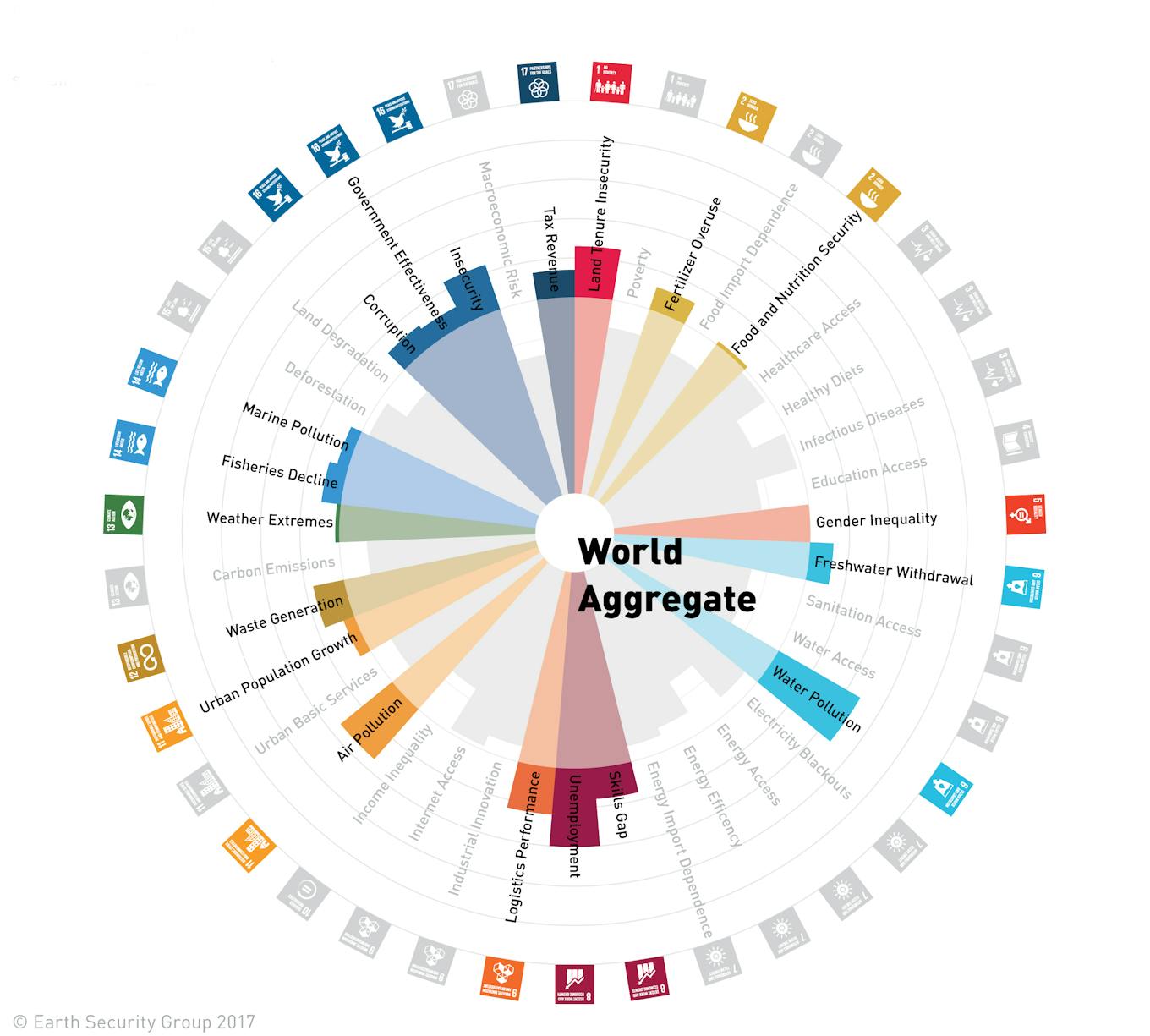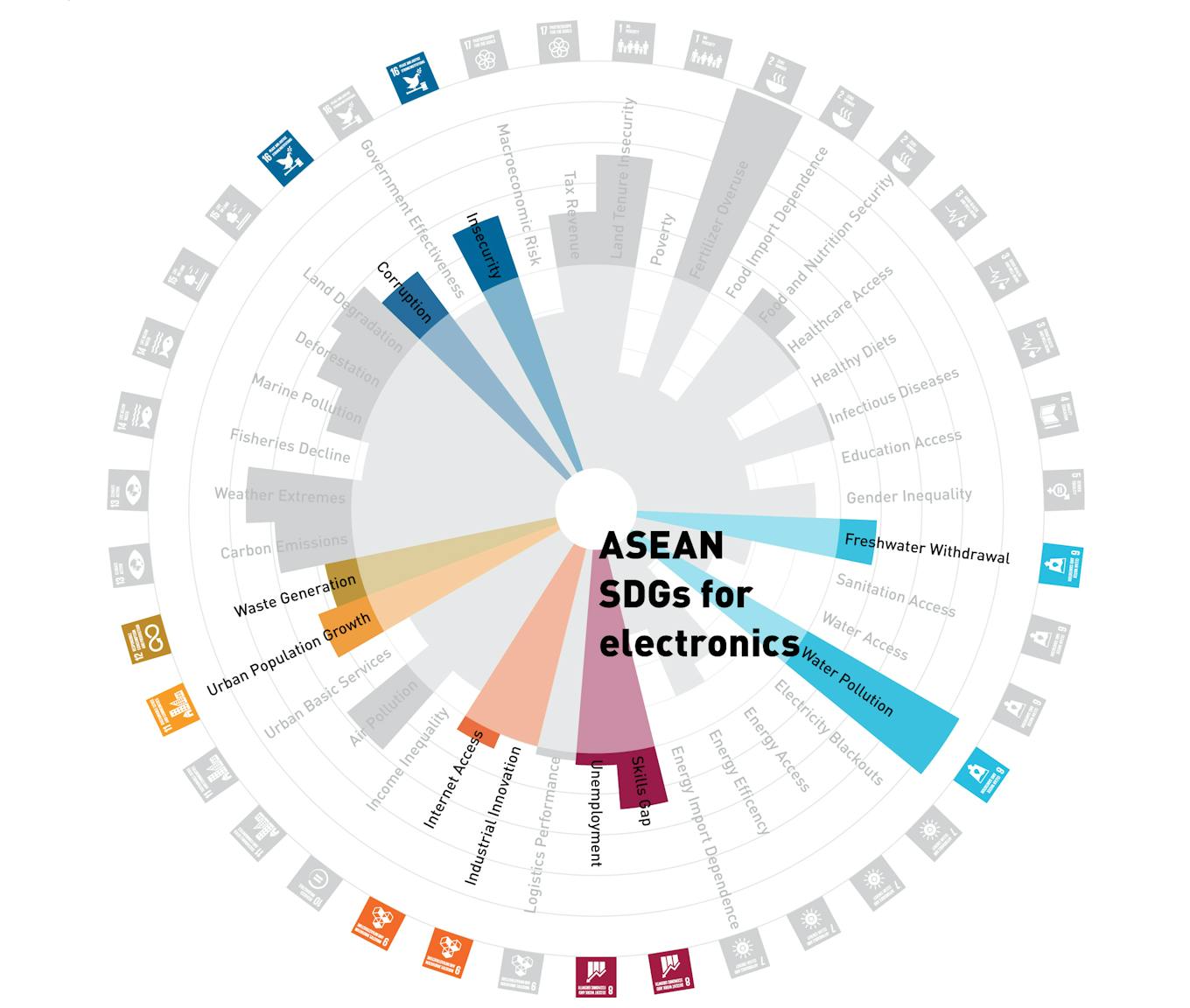Problems such as water pollution, unemployment, high greenhouse gas emissions and corruption not only undermine the progress of sustainable development efforts worldwide, they also threaten the ability of businesses to lock in a secure and prosperous future for themselves.
To continue reading, subscribe to Eco‑Business.
There's something for everyone. We offer a range of subscription plans.
- Access our stories and receive our Insights Weekly newsletter with the free EB Member plan.
- Unlock unlimited access to our content and archive with EB Circle.
- Publish your content with EB Premium.
This was the urgent reminder delivered to the private sector by the 2017 edition of the Earth Security Report, an annual toolkit to help businesses bring their corporate practices in closer alignment with the sustainable development priorities of countries worldwide.
Titled ‘Sustainable Development Goals for Business Diplomacy and Growth’ and released on Tuesday, the report by London-based strategic advisory firm Earth Security Group analysed datasets on metrics related to the United Nations’ Sustainable Development Goals (SDGs), to identify specific pressure points for business and society.
The SDGs are a set of 17 targets for global development that the world aims to meet by 2030, including ending hunger, poverty and gender inequality, promoting clean energy and climate action, and building strong public institutions to achieve peace and justice.
The report also recommended strategies for how businesses can offer solutions to environmental and social problems, while reducing their own vulnerability to risks arising from these pressures.
Globally, some of the most pressing SDG-related risks for businesses include air and water pollution, unemployment, governance challenges such as insecurity and corruption, as well as the growth of urban populations.

An aggregate map of the factors that put pressure on global sustainable development efforts, and how they correspond with the SDGs. Image: Earth Security Group/Earth Security Report 2017
Through a regional analysis, the report outlined SDG-related risks in India, China, Southeast Asia, Latin America, and Africa, and how they affect specific sectors.
Alejandro Litovsky, founder and chief executive officer, Earth Security Group, told Eco-Business that in Asia, “the most critical pressures will be those related to access to safe human conditions that underpin quality of life and well-being.”
These correspond to SDG 6 (water pollution and water access), SDG 11 (air pollution), and SDG 16, on good governance and security. Problems in achieving these three goals undermine other SDGs such as health and well-being, Litovsky explained.
He added: “This raises the bar of the sustainable business agenda for Asia, focusing on how companies will help to build sustainable societies in the region.”
“
Sustainable business is the only option for building a safe and resilient world where prosperity is shared and poverty is made history.
Peter Bakker, president and chief executive officer, World Business Council on Sustainable Development
Asia’s SDG priorities
In Southeast Asia, for instance, the report said that poor working conditions in factories pose a major challenge for global electronics companies.
The Association of Southeast Asian Nations (Asean)—a regional bloc comprising Brunei, Cambodia, Indonesia, Laos, Malaysia, Myanmar, the Philippines, Singapore, Thailand, and Vietnam—is seeking to overtake China as a global hub for manufacturing electronics companies, and these firms, too, are increasingly setting up operations in various Asean countries.
Multinationals such as Intel and Texas Instruments have set up production facilities in Malaysia, while electronics giants Samsung, LG, Canon and Nokia have all set up production lines in Vietnam.
However, the electronics manufacturing industry is rife with low-skilled, low-wage jobs in assembly and packaging, which often make use of migrant workers who are employed on a contract basis. Reports of compulsory overtime, dangerous working conditions, and low pay are common, noted the report.
Given the increasing scrutiny on electronics companies to ensure that their supply chains are environmentally and socially responsible, the industry must create business models that align with SDGs related to Decent Work and Economy Growth (Goal 8), Responsible Consumption and Production (Goal 12) and Sustainable Cities and Communities (Goal 11), noted the report.
The study had several recommendations for how businesses can do this. Companies can embed decent working conditions as a feature of their products—this is something Amsterdam-based company Fairphone has done. Global electronics firms should also coordinate with business associations in Asean to develop industry platforms that foster closer collaboration on policy and practical measures to achieve better working conditions.

How SDG-related challenges in Asean affect the global electronics sector. Image: Earth Security Group/Earth Security Report 2017
Meanwhile in India, the pharmaceutical industry has business opportunities in the form of an urgent need to expand healthcare services, low research and development costs, and high levels of biodiversity, which provides an important resource for product development.
But at the same time, the industry has caused widespread pollution in the country by discharging untreated effluent into waterways. The sector must also grapple with growing human resistance to antibiotics—a dangerous trend which is leading to an increase in drug-resistant infections. These issues expose the industry to risks such as increasing public scrutiny and stricter regulation around water pollution.
To address these challenges, the report suggested that Indian pharmaceutical companies should adopt sustainable financing strategies to develop zero-wastewater facilities, and that Indian industry associations should work closely with the global Antimicrobial Resistance Industry Alliance—a coalition of pharmaceutical, biotechnology and diagnostics companies to tackle a rise in drug-resistant bacteria.
Members of India’s national campaign on responsible antibiotic use—the Indian health ministry and a pharmaceutical company industry association run this initiative—should also deploy crowd-sourcing technologies to allow citizens to report water pollution, suggested the report. This would be useful in a country where pollution inspections and measures to enforce control are under-funded.
In addition to these country and sector-specific recommendations, the report also noted that more broadly, infinite growth is not possible on a finite planet; all businesses must therefore re-think their economic models so that they can secure long-term commercial stability while also protecting social and ecological systems.
From insights to action
As businesses work to adapt their practices in response to these societal trends, government policies will be key to transforming how the private sector works, noted the report. It is therefore essential for companies to work closely with governments to help policymakers understand the barriers they face in terms of scaling sustainable development, and the incentives that would help them make progress on the SDGs.
Earth Security Group’s Litovsky noted that business strategy, corporate affairs, and investor relations teams in a company should take special notice of the report’s findings and recommendations for action. Strategists can ensure the new products and models they develop are in alignment with the SDG priorities of the markets where they operate, while corporate affairs teams can develop an action plan for how to engage with governments to advance policy dialogue.
Meanwhile, investor relations experts can use the report’s analysis to frame communications to investors, and show them how they are meeting the SDG priorities of the markets they plan to grow in, Litovsky noted.
Zoe Knight, group head of HSBC Centre of Sustainable Finance—a supporting organisation of the report—said in a statement: “This report’s clear and powerful analysis sets out both how to integrate ESG issues strategically and how to focus on SDG impacts that are material to economic growth.”
Peter Bakker, president and chief executive officer of the World Business Council for Sustainable Development, which endorsed the report, added that “sustainable business is the only option for building a safe and resilient world where prosperity is shared and poverty is made history.”
“Business solutions aligned with the SDGs enable companies to better manage their risks, as well as anticipate consumer demand, build positions in growth markets, secure access to needed resources, and strengthen their supply chains, all while moving the world towards the delivery of the Global Goals,” Bakker added.










